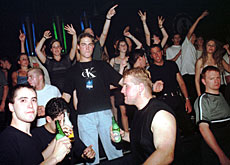Swiss youths turn to alcohol and drugs

A growing number of young Swiss are turning to alcohol and drugs as a way of dealing with stress, according to a study presented on Wednesday.
It found that while a majority of 16- to 20-year-olds were in good health, 30 per cent admitted to emotional problems, depression and eating disorders.
Stress and an uncertain future are at the core of Swiss youths’ concerns, the survey of 7,400 adolescents showed. It was carried out last year by three university institutes with the support of the Federal Health Office.
“Some of these youngsters feel vulnerable and cannot cope with stress such as the problem of their future,” Pierre-André Michaud from the Institute of Social and Preventive Medicine, told swissinfo.
“But part of the problem is also that we have a very competitive society with high standards.” He said those who felt least able to cope often turned to alcohol and drugs.
Drink and drugs
“We have a fairly large rise in alcohol, cannabis and hard drugs consumption,” Michaud noted.
“For those who are vulnerable to these substances, while it’s obviously the wrong solution to the problems or stresses they face, it’s often the one they find.”
Drunkenness has soared since the last such survey was conducted a decade ago. Some 60 per cent of boys in the age group and 40 per cent of girls said they had been drunk at some point in the previous month.
Adolescents are also increasingly turning to drugs such as cannabis, cocaine, LSD and ecstasy, the study found, with one adolescent in three smoking on a regular basis.
Suicide
The survey’s authors said they were worried by the significant number of youths who attempt or commit suicide.
Eight per cent of girls and three per cent of boys admitted to attempting to take their own life at some point.
“Death by suicide is more prevalent among boys because they tend to use very efficient or violent means, like jumping from a bridge. Girls on the other hand, will rely on medication or drugs,” Michaud said.
One of the lessons drawn from the survey, Michaud explained, was that more support should be given to schools and parents.
“The family has a very important role to play even during the last years of adolescents while a broad health-promotion approach in schools is efficient in reducing problematic behaviour such as substance abuse.”
Sexuality
One area which showed positive results was sex and AIDS education where Switzerland has one of the highest rates of contraception use and one of lowest rates of unwanted or unplanned pregnancies, Michaud said.
“Swiss people are very sensible, well informed and have reflected on the issues… so they can make their own choices.”
The success achieved in these areas should be replicated in other areas where youngsters show they need more support, the report’s authors said, and suggested starting programmes to address Swiss youths’ concerns.
“It is important to think of young people not in terms of problems, but as resources, and we intend to work with young people and youth clubs and design solutions to problems,” Michaud said.
swissinfo, Samantha Tonkin and Isobel Leybold
30% of Swiss adolescents said they suffered from emotional and relationship problems.
35% of girls and 20% of boys said they sometimes felt depressed enough to look for a way out.
40% of girls said they were unsatisfied with their body and 70% of girls said they needed to lose weight.
25% of boys and 19% of girls were the victim of physical violence during 2002.
8% of girls and 3% of boys said they had tried to commit suicide at some point in their lives.

In compliance with the JTI standards
More: SWI swissinfo.ch certified by the Journalism Trust Initiative














You can find an overview of ongoing debates with our journalists here . Please join us!
If you want to start a conversation about a topic raised in this article or want to report factual errors, email us at english@swissinfo.ch.